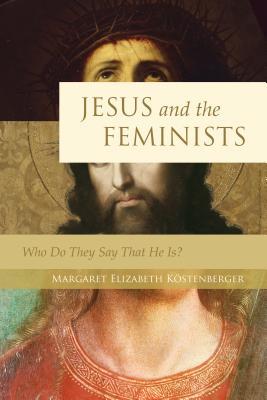Margaret Kostenberger’s Jesus and the Feminists, Reviewed by Mara Lief Crabtree
 Margaret Elizabeth Kostenberger, Jesus and the Feminists: Who Do They Say That He Is? (Wheaton, Crossway, 2008), 253 pages, ISBN 9781581349597.
Margaret Elizabeth Kostenberger, Jesus and the Feminists: Who Do They Say That He Is? (Wheaton, Crossway, 2008), 253 pages, ISBN 9781581349597.
Kostenberger, an adjunct professor of women’s studies at Southeastern Baptist Theological Seminary, is an apologist for the male headship and complementarian viewpoints regarding women in ministry leadership. She “attempts to chronicle the feminist quest of the historical Jesus” concluding that “what emerges from feminist scholarship on Jesus is not one version of the true Jesus but many different accounts of who feminists perceive Jesus to be” (16). Embracing a perspective based on Evangelical theological tradition, Kostenberger eschews “the viability of feminism at large” maintaining that “the validity of feminist biblical interpretation . . . comes into question” (16). She chronicles the feminist quest to understand Jesus through a study of various scholars and their works, inclusive of the radical, reformist, new feminist, egalitarian and evangelical streams of feminist theology. Although her examples are not inclusive of extant feminist scholarship, Kostenberger does include well-known representative scholars from the aforementioned streams, including Mary Daly, Virginia Ramey Mollenkott, Daphne Hampson, Letty Russell, Rosemary Radford Ruether, Elisabeth Schüssler Fiorenza, and Kathleen Corley, Linda Belleville, Douglas Groothuis, John Phelan, Aida Bensançon Spencer and others. Omitted are, for example, egalitarian feminist scholars Catherine Clark Kroeger, Alvera Mickelson and womanist theology scholars including Stacey M. Floyd-Thomas, Katie Geneva Cannon and others. This lack of inclusiveness in presenting a more comprehensive study of feminist theology is a primary weakness of the text. That stated, Margaret Kostenberger’s study of the included feminists is ambitious in presenting an historical and theological overview of both the nascence and further development of much of feminist scholarship.
Kostenberger also examines the hermeneutical framework, the genre of the Gospels and their historical-cultural background. She lists and briefly discusses, in literary context, those passages on Jesus and women in the Gospels. The book, in discussing these passages, hinders its possible scope and depth of scholarship. The individual discussions are simply too brief in content to provide an adequate account of the rich substance and nuance of each passage.
Of concern are both the narrowness of content and lack of spiritual depth in the book’s presentation of Jesus and his interactions with women. The Gospels’ present Jesus with a power, depth and intensity in describing both the qualities of humanness and divinity in His relationships with women. Readers of those passages cannot help but be confronted intellectually, emotionally and spiritually by the reality of the writers’ accounts. Kostenberger’s discussions miss the Gospels’ realness in revealing the multifaceted interactions of Jesus with women. The discussions miss the full depth of spirituality and emotion, the quality of intellectual exchange and Jesus’ tenderness for the weak; his prophetic yet loving confrontation of the sinner and his quiet, powerful compassion. Although Kostenberger mentions Jesus’ sensitivity to particular individuals and groups of women, and His recognition of women’s personhood, stating that “Jesus treated women consistently with respect, dignity, compassion, and kindness” (211) her brief accounts miss the opportunity for a more thorough discussion to highlight Jesus’ respect for the intellect and character of women; for the value of their lives; for their questions, their needs and their suffering. The discussions fail to include the Gospels’ passages that indicate Jesus’ invitation to women to join in mission and ministry; His invitation to the kingdom and His joy in affirming their giftings and callings. The Jesus in Jesus and the Feminists seems not quite the full, complete friend and Savior known by those women of the Gospels.
Category: In Depth


